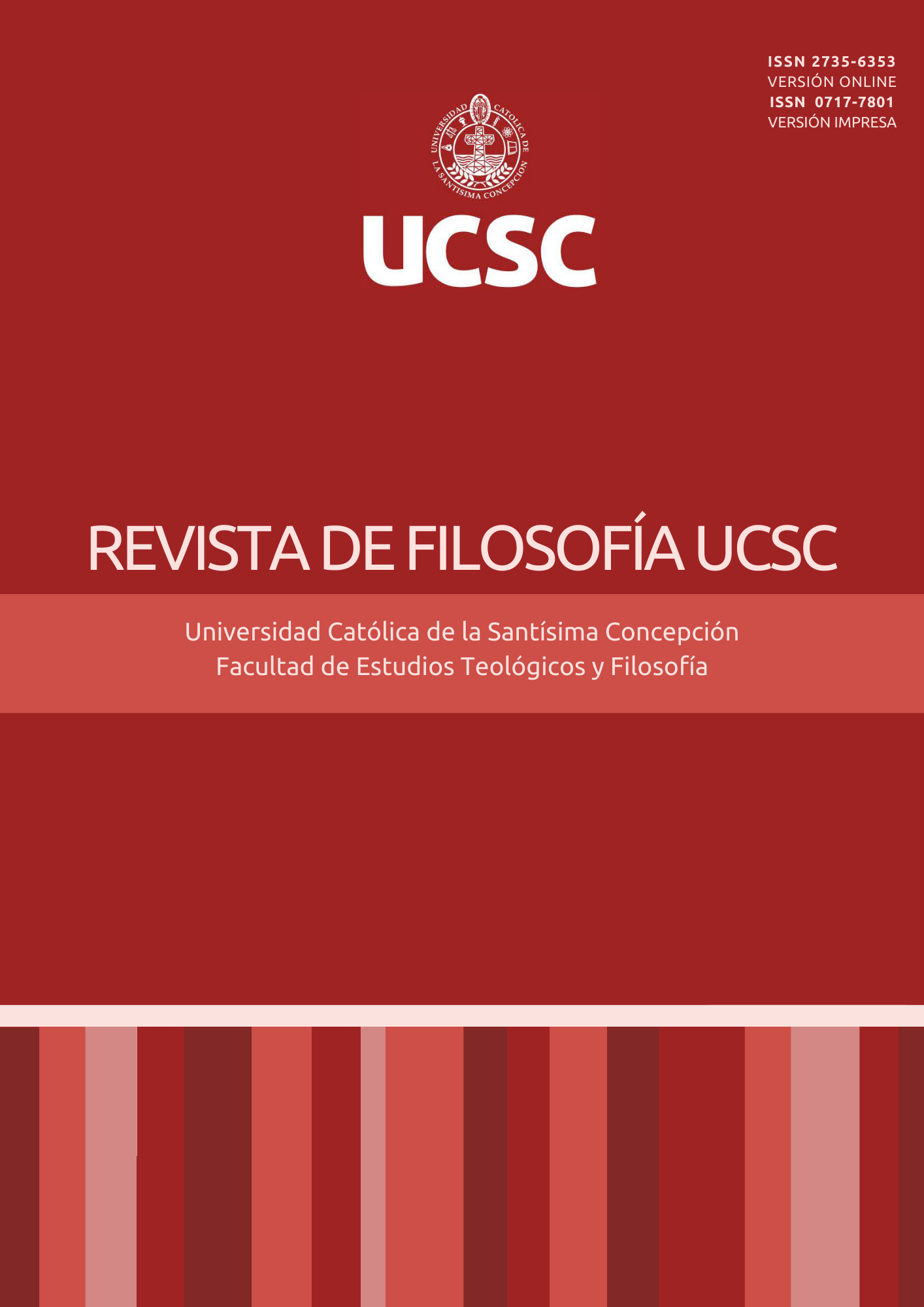In the name or how to avoid speaking of it
Main Article Content
Abstract
In this text Jean-Luc Marion offers a critical reading of Derrida’s interpretation of Denys, clarifying his own position regarding mystical theology. Starting from an analysis of each one of the four objections presented by Derrida, Marion presents the third way, the way of de-nomination; he analyzes the status of praise and prayer; he distinguishes mysticism from the metaphysics of presence and from ontotheology; and outlines the features of the phenomenon of revelation.
Article Details
Section

This work is licensed under a Creative Commons Attribution-NonCommercial 4.0 International License.
The Revista de Filosofía UCSC is an open access journal and does not charge for publication. In addition, it regulates its Copyright and access policy according to the Creative Commons Attribution-NonCommercial 4.0 International Public License (CC BY-NC 4.0), therefore sharing (reproducing and distributing the material in any medium or format) and adaptation (modifying, transforming, and creating from the material) is allowed as long as proper credit is given and the citation is included with the corresponding data. Moreover, it is not allowed to use the material for commercial purposes.
How to Cite
References
Aecio. (1982). Apologie (B. Sesboüé, Trad.). En Sources chrétiennes (Vol. 305). Paris: Cerf.
Agustín de Hipona. (1984). De ordine (J. Jolivet, Ed. y Trad.; Vol. 4). Paris: Desclée de Brouwer.
Agustín de Hipona. (1965). Contre les hérésies (A. Rousseau, Trad.; Vol. 100). Paris: Cerf.
Agustín de Hipona. (n.d.). De Trinitate. Patrologiae Cursus Completus, Series Latina (Vol. 32).
Agustín de Hipona. (n.d.). Sermones. Patrologiae Cursus Completus, Series Latina (Vols. 38).
Atenágoras. (n.d.). À Autolycos. Patrologiae Cursus Completus, Series Graeca (Vol. 6).
Basilio de Cesarea. (1970). Contre Eunome (B. Sesboüé, Trad.; Vol. 299). Paris: Cerf.
Basilio de Cesarea. (1982). Contre Eunome (B. Sesboüé, Trad.; Vol. 305). Paris: Cerf.
Basilio de Cesarea. (n.d.). Lettres. Patrologiae Cursus Completus, Series Graeca (Vols. 32).
Bernardo de Claraval. (n.d.). De consideratione. Patrologiae Cursus Completus, Series Latina (Vol. 182).
Bruaire, C. (1974). Le droit de Dieu. Paris: Aubier.
Clemente de Alejandría. (1981). Stromates (A. Le Boulluec, Trad.; Vol. 275). Paris: Cerf.
Concilio de Letrán IV. (n.d.). Enchiridion Symbolorum.
Coward, H., & Foshay, T. (Eds.). (1992). Derrida and Negative Theology. Nueva York: SUNY Press.
Crisóstomo, J. (1970). De l’incompréhensibilité de Dieu (J. Daniélou, A.-M. Malingrey, & F. Flacelière, Trads.; Vol. 28bis). Paris: Cerf.
Damasceno, J. (n.d.). De la foi orthodoxe. Patrologiae Cursus Completus, Series Graeca (Vol. 94).
Daniélou, J. (1945). Platonisme et théologie mystique. Paris: Aubier.
Daniélou, J. (1964). « ‘Mystique’ au XVIIe siècle. Le problème du langage ‘mystique’ ». En L’homme devant Dieu. Mélanges offerts au P. Henri de Lubac (Vols. 2). Paris: Aubier.
Denys l’Aréopagite. (1943). Œuvres complètes du pseudo-Denys l’Aréopagite (M. de Gandillac, Trad.). Paris: Aubier.
Denys l’Aréopagite. (1990). Œuvres complètes du pseudo-Denys l’Aréopagite (M. de Gandillac, Trad.). Paris: Aubier.
Derrida, J. (1967). L’écriture et la différence. Paris: Seuil.
Derrida, J. (1972). Marges de la philosophie. Paris: Minuit.
Derrida, J. (1987). Psyché. Paris: Galilée.
Derrida, J. (1990). Le problème de la genèse dans la philosophie de Husserl. Paris: PUF.
Derrida, J. (1993). Sauf le nom. Paris: Galilée.
Eckhart, M. (1976). Deutsche Werke (J. Quint, Ed.; Vols. 3). Stuttgart: Kohlhammer.
Eckhart, M. (1979). Sermons (J. Ancelet-Hustache, Trad.; Vols. 3). Paris: Seuil.
Eriúgena, J. S. (1995). De divisione naturae (F. Bertin, Trad.; Vol. 1). Paris: Les Belles Lettres.
Eunome. (1983). Apologie (B. Sesboüé, Trad.; Vol. 305). Paris: Cerf.
Filón de Alejandría. (1972). La posterité de Caïn. Paris: Cerf.
Foshay, T. (1992). Derrida and Negative Theology. En H. Coward & T. Foshay (Eds.), Derrida and Negative Theology (p. 12). Nueva York: SUNY Press.
Grégoire de Nysse. (1964). Vie de Moïse (H. Musurillo, Trad.). En Grégoire de Nysse. Opera (pp. 87-88). Leiden: Brill.
Grégoire de Nysse. (1968). Vie de Moïse (J. Daniélou, Trad.; Vol. 1bis). Paris: Cerf.
Grégoire de Nysse. (n.d.). Contra Eunomium. Patrologiae Cursus Completus, Series Graeca (Vols. 45).
Grégoire de Nazianze. (1978). Discours 27-31 (P. Gallay & M. Jourjon, Trads.; Vol. 250). Paris: Cerf.
Hart, K. (1989). The Trespass of the Sign. Deconstruction, Theology and Philosophy. Cambridge: Cambridge University Press.
Heidegger, M. (n.d.). Gesamtausgabe (Vols. 60). Frankfurt: Klostermann.
Hilaire de Poitiers. (n.d.). De Trinitate. Patrologiae Cursus Completus, Series Latina (Vols. 10). París: J.P. Migne.
Hölderlin, F. (1943). Poèmes de la folie de Hölderlin. Paris: Gallimard.
Husserl, E. (1950). Ideen zu einer reinen Phänomenologie und phänomenologischen Philosophie. La Haya: Nijhoff.
Irénée de Lyon. (1965). Contre les hérésies (A. Rousseau, Trad.; Vol. 100). Paris: Cerf.
Kermode, F. (1987). Endings, Continued. En S. Budick & W. Iser (Eds.), Languages of the Unsayable: The Play of Negativity in Literature and Literary Theory (pp. 75-89). Nueva York: Columbia University Press.
Levinas, E. (1951). L’ontologie est-elle fondamentale? Revue de métaphysique et de morale, (1), 20.
Levinas, E. (1991). Entre nous. Essais sur le penser-à-l’autre. Paris: Grasset.
Levinas, E. (1979). Le temps et l’autre. Paris: Fata Morgana.
Lubac, H. de. (1945). De la connaissance de Dieu. Paris: Desclée de Brouwer.
Marion, J.-L. (1977). L’idole et la distance. Paris: Grasset.
Marion, J.-L. (1991). Questions cartésiennes: méthode et métaphysique. Paris: PUF.
Marion, J.-L. (1991). Saint Thomas d’Aquin et l’onto-théo-logie. Revue thomiste, 95(1), 31-66.
Marion, J.-L. (1997). Étant donné. Essai d’une phénoménologie de la donation. Paris: PUF.
Marion, J.-L. (2005). Le visible et le révélé. Paris: Cerf.
Maxime le Confesseur. (n.d.). Ambigua. Patrologiae Cursus Completus, Series Graeca (Vol. 91).
Mortley, R. (1986). From Word to Silence (Vols. 2). Bonn: Hanstein.
Mortley, R. (1991). What is Negative Theology? En R. Mortley & D. Dockerill (Eds.), Prudentia Supplementary.
Nicolas de Cues. (1964). Philosophisch-theologische Schriften (L. Gabriel, Ed.; Vols. 3). Viena: Herder.
Origène. (1976). Des principes (H. Görgemanns & H. Karpp, Eds.). Darmstadt: Wissenschaftliche Buchgesellschaft.
Pryzwara, E. (1962). Analogia Entis. Einsiedeln: Johannes Verlag.
Sales, M. (1970). La théologie négative, méthode ou métaphysique. Axes, 3(2).
Spinoza, B. (n.d.). Ethica.
Thomas d’Aquin. (1927). Prologue au Commentaire des Noms divins. En Opuscula omnia (Vol. 2, p. 221). Paris: Mandonnet.
Thomas d’Aquin. (n.d.). Summa Theologiae.
Völker, W. (1958). Kontemplation und Extase bei Pseudo-Dionysius Areopagita. Wiesbaden: Steiner.




